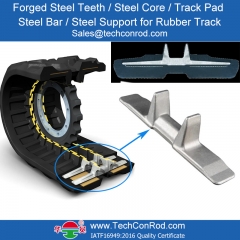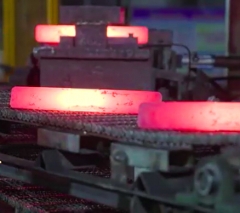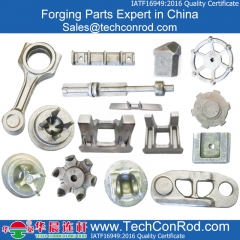 +86-151 9217 7108
+86-151 9217 7108
 +86-151 9217 7108
+86-151 9217 7108

High quality steel Die Forging parts with material 40Cr 42CrMo and C70S6
read more
High quality steel Die Forging parts with material 40Cr 42CrMo and C70S6
read more
High quality steel forging parts with material 40Cr 42CrMo and C70S6
read more
OEM high performance steel forging parts at China price.
read morePrecision forging refers to the forming technology that only needs a small amount of processing or no more processing to meet the dimensional accuracy requirements of parts after forging. There are mainly two ways to realize precision forging: refining blank, that is, directly forging blank that meets the requirements of precision machining. The whole or some parts of the precision forging are directly processed by the precision forging process, so as to reduce the machining amount. At present, there are many precision forging processes used in production. According to different forming temperatures, it can be divided into hot precision forging, cold precision forging, warm precision forging, composite precision forging, etc.
1. Hot precision forging process
Hot precision forging refers to the process of forging above recrystallization temperature. Because of the high deformation temperature, the material has low deformation resistance and good plasticity during forging, so it is easy to form parts with complex geometry.
2. Cold precision forging process
The cold precision forging process is a precision forging forming technology that is forged at room temperature. Because of forming at room temperature and avoiding the size error caused by thermal expansion and cold contraction, the shape and size of the cold precision forging workpiece are easy to control. At the same time, the forging surface does not produce oxidation and burning loss, and has high surface quality. Therefore, the forging accuracy of hot precision forging and warm precision forging is lower than that of cold precision forging.
3. Warm precision forging process
Warm forging is a precision forging technology that heats the metal to a suitable temperature below the recrystallization temperature. It has the advantages of hot forging and cold forging at the same time to avoid their defects, effectively reduce the load of equipment and dies, improve the plasticity and fluidity of metal, and does not need forging and annealing.
4. Composite precision forging process
Composite precision forging process is a forging technology that combines cold, warm and hot forging processes to complete the forging of a workpiece. It can give play to the advantages of cold, warm and hot forging and avoid the disadvantages of cold, warm and hot forging. At the same time, the mechanical properties, dimensional accuracy and surface quality of the parts produced by composite precision forging technology are improved compared with those produced by single forging technology. At present, the commonly used composite precision forging processes mainly include warm forging cold finishing, hot forging cold forging, warm extrusion cold rotary forging, warm hot precision forging cold extrusion, hot precision forging cold rotary forging, etc.
 online
online 0086-635-4560298
0086-635-4560298 0086-635-4560298
0086-635-4560298 info@techconrod.com
info@techconrod.com +86-151 9217 7108
+86-151 9217 7108